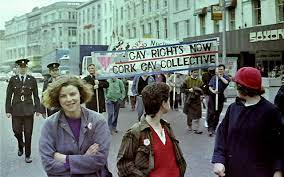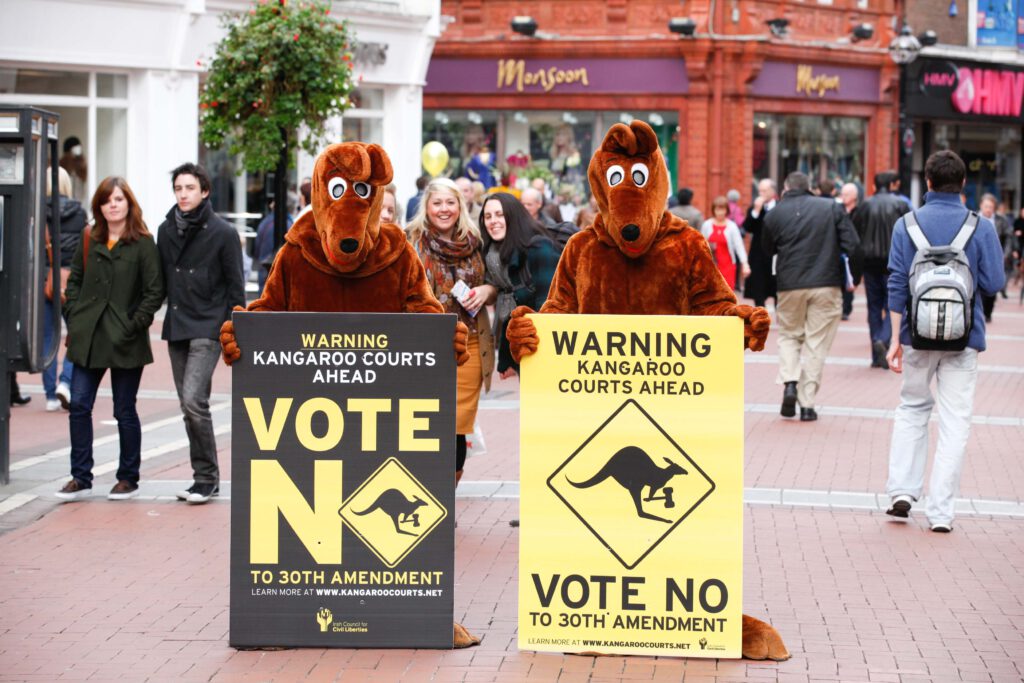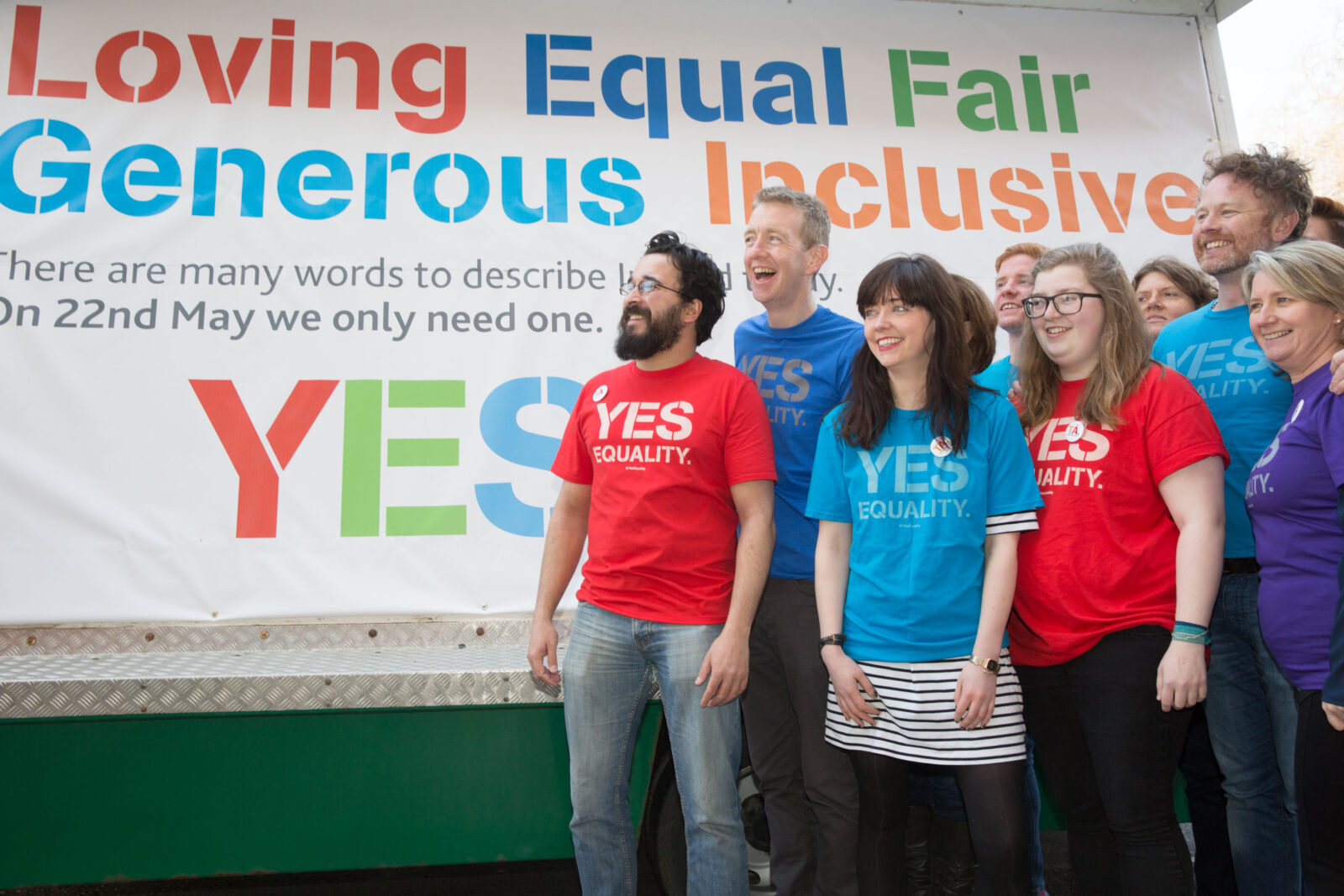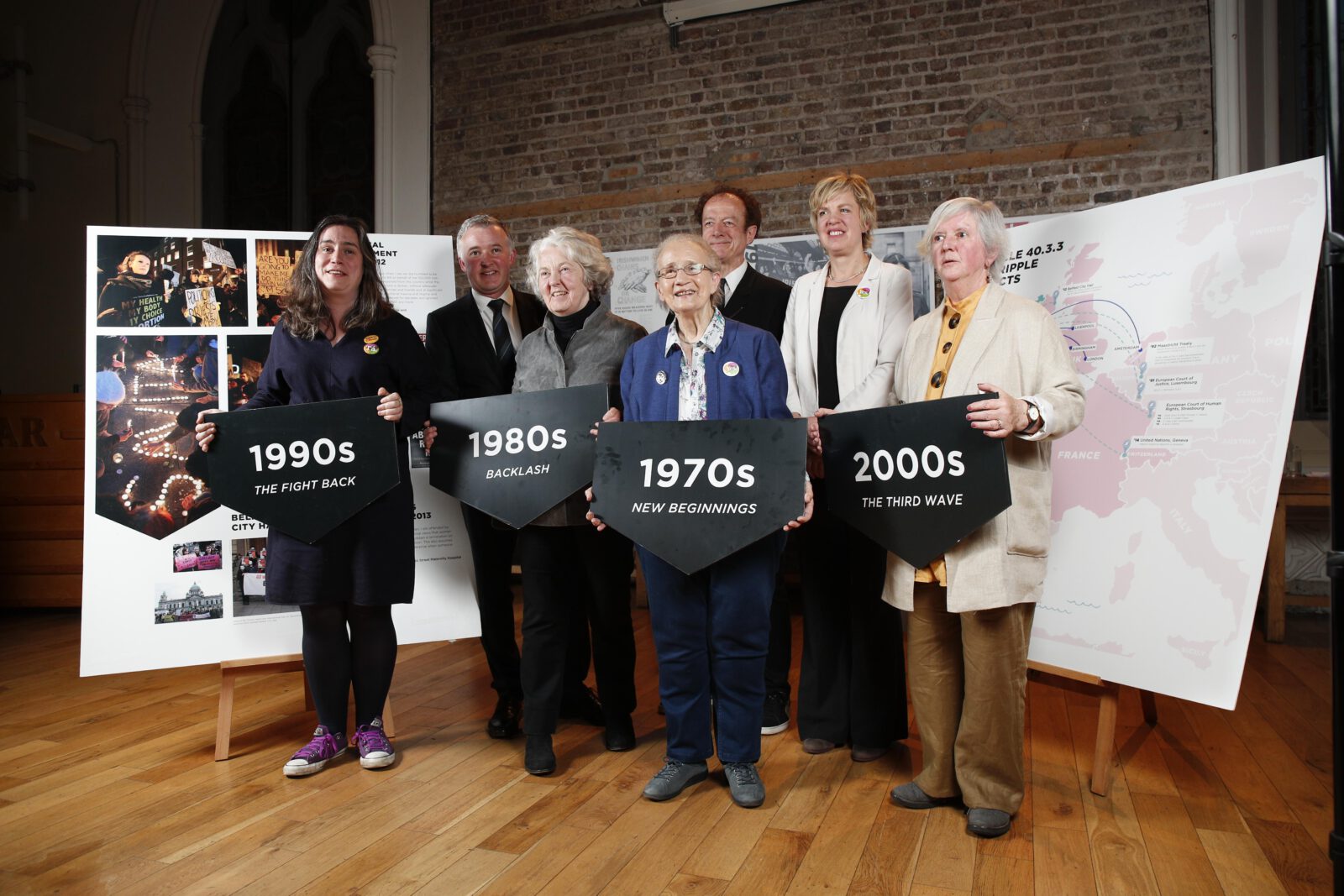ICCL was founded in 1976. With our members, we’ve been at the forefront of seismic change for the past 45 years. Take a closer look.
Foundation – 30 June 1976
“This Council is being formed to promote human rights, protect civil liberties, recover
them where they have been removed, and enlarge them where they have been diminished.”
These are the words of Kader Asmal – an anti-apartheid campaigner and later Minister for Education in Mandela’s South Africa – as he and many others established ICCL. Alongside Asmal was none other than Mary Robinson – later President of Ireland and UN High Commissioner for Human Rights.

Early Days – 1970s
The issues identified of immediate concern at that first meeting were the need for independent Garda complaints procedures; a proper system of legal aid in civil and criminal cases; equality for women; a campaign for children’s rights; protecting the rights of psychiatric patients and ending capital punishment.
Against a backdrop of increasing violence in the North, and increasingly draconian emergency measures to deal with them, ICCL established itself as a voice against police brutality and state over-reach.
Mary Robinson remarked of those days: “I recall the passion with which we addressed twin challenges: The need to create political and personal space in Ireland through reform of the Constitution and laws, and the need to affirm standards of civil liberties in the context of the increasing violence in Northern Ireland.”
1980s – contraception, gay rights, divorce and abortion
ICCL was always at the forefront of societal change. We were one of the first organisations to oppose the 1983 insertion of the 8th amendment into the Constitution. The amendment, which put the Constitutional right to life of a foetus on an equal footing with that of a woman, would go on to cause suffering and death over the next 35 years.
ICCL took up the issue of gay rights early on, and elected Senator David Norris to the Executive. ICCL later established a working group on the issue. Norris took a case to the European Court of Human Rights in 1988 and won, setting in motion the process that would lead to decriminalisation of homosexuality.

The 1986 divorce referendum was precipitated in part by a 1979 ICCL paper The Case for Divorce in the Irish Republic. ICCL was a founder member of the Divorce Action Group in 1980.
Freedom of expression has been one of ICCL’s brightest torches since our foundation. In the 1980s we withstood accusations of having links to paramilitary organisations because of our loud opposition to Section 31 of the Broadcasting Act, which empowered the relevant Minister to prevent the broadcast “of any particular matter, of any particular class”. During the Troubles, it was used to ban paramilitaries from the airwaves, but ICCL maintained that Section 31 “strikes at the heart of a democratic system of free expression”. ICCL also opposed moralistic state censorship, including of publications such as Gay News and The Joy of Sex.
An ICCL pamphlet Innocent Until Proven Guilty was instrumental in preventing the enactment of the 1983 Criminal Justice Bill which proposed, among other things, detention for the purposes of interrogation and curtailing the right to silence.
1990s – equality laws, abortion referendums and free speech
ICCL published Equality Now in 1990 calling for complete equality for lesbians and gay men. When homosexuality was decriminalised in 1983, one of the co-authors of that pamphlet, Chris Robson, said
as a group we tend to prevent worse things happening, or else secure minor advances.
Yet here was a clear victory which transformed thousands of lives. It was as if there were 200,000 new citizens that day.
The previous decades’ work on Travellers’ rights and rights for people with disabilities also bore fruit in the 90s. The Employment Equality Act and the Equal Status Act both outlawed discrimination on 9 grounds, including sexual orientation, disability, and membership of the Traveller community.
The X case precipitated a referendum on providing information and travelling for abortion. ICCL expressed “extreme concern” at judicial willingness to suspend the freedom of movement of a 14-year old rape victim who wanted to travel for an abortion. We called for a yes vote to allow such travel.
1994 saw the repeal of Section 31 of the Broadcasting Act which ICCL had opposed since our inception.
The murder of Veronica Guerin and rise in gangland activity saw the reintroduction of seven-day detention, one of the things ICCL had successfully eradicated in the 80s. ICCL opposed it again and suggested alternatives, and eventually the practice was ended.

2000s – police oversight, abortion and citizenship
In 2002, government proposed a referendum to allow abortion where a woman’s life was at risk except in the case of suicide. ICCL argued this demeaned women, urged a no vote, and called instead for full repeal of the 8th amendment.
ICCL opposed the 2004 Citizen Referendum, which left children of foreign-born parents on an unequal footing with their peers.
The establishment of a partially independent Ombudsman for the Police (GSOC) in 2004 was a huge win for ICCL. The bigger victory was for anyone who had ever experienced mistreatment at the hands of a garda and discovered there was nowhere to turn. ICCL had campaigned for an independent complaints body since 1976. That campaign continues today, with ICCL’s call for a completely independent Police Ombudsman.
To read more about ICCL’s achievements, including campaigns against marital rape and child sex abuse, over our first three decades, see here.
2010s – Marriage Equality and reproductive choice at last!

This was a great decade for Irish society, and for ICCL. Decades of work on LGBTI+ rights, and on abortion, both hugely unpopular issues at the time, paid off.
ICCL was one of three organisations to lead the Marriage Equality campaign in 2015, securing equal marriage for gay couples. And in 2018, ICCL was part of the Together for Yes campaign which finally repealed the 8th amendment and brought in abortion on demand up to 12 weeks gestation.
ICCL continued our work for equality, focusing in on hate crime. We also focused on victims’ rights within the Court system.
Work on freedom of expression continued, with ICCL supporting artists’ freedom of expression and successfully campaigning for the repeal of blasphemy as a Constitutional offence.

ICCL Today
ICCL is continuing to lead ambitious programmes of work on garda reform, fair trial rights, equality, women’s rights, privacy and freedom of expression. We are currently expanding work on the complex human rights issues that arise in the digital sphere. All the time we are true to our founding values and issues such as the right to protest and the Special Criminal Court remain at the heart of our work. We also apply our founding principles of due process, equality before the law and the need for democratic accountability to new challenges such as those presented by Covid-19.
Ireland is a fairer, more inclusive, and tolerant country because of the human rights movement. Will you be part of it?

